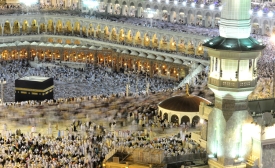mecca
Saudi Arabia announced on Thursday that it is reopening its border with Qatar to allow Qataris to attend the hajj, despite a monthslong rift between Doha and four Arab countries led by Riyadh that prompted both sides to trade accusations of politicizing the pilgrimage.
Saudi Arabia has announced plans to create a tourism hotspot nearly twice the size of Wales on its unspoilt Red Sea coastline, in a bid to help double the number of visitors to the Middle Eastern country. The Kingdom has also indicated that it is prepared to relax its strict laws, such as bans on drinking alcohol, to entice more western holidaymakers.
Saudi Arabia has a unique approach of vacillating between using hard and soft power. This approach is directly linked to Saudi Arabia being one of the wealthiest nations in the world, the home of the Islamic religion, and possessing vast oil reserves.

Najah Al-Osaimi considers Saudi Arabia's smart power strategy.
The Twittersphere and social media is abuzz in the Arab-Muslim world, this time over what conservative clerics say is a controversial practice of hajj pilgrims to Mecca taking “selfies” with their smartphone devices.

As evident in Sao Paulo, London, Singapore, and New York, the diplomatic role of global cities is increasing.
Roughly half of the city’s 40,000-odd cabbies are Muslims who hail from countries all over the Middle East, Africa and elsewhere — and a great number of the drivers are observant, praying five times a day. Which raises the question: How and where do these men on the move pray? When you spend your days driving a taxicab, it’s impossible to say where, at any given moment, you might wind up. Followers of Islam can perform their five daily prayers in any relatively clean space, even bowed down on the side of the road. But the process isn’t so simple.







